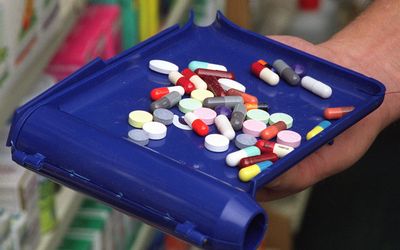A NEW tool for women to protect themselves against HIV is a step closer, with the announcement on Monday that a vaginal ring containing the antiretroviral drug dapivirine is safe and reduces the risk of infection by up to 56%.
The results of two phase 3 studies — the Ring Study and ASPIRE — were released on Monday at the annual Conference on Retroviruses and Opportunistic Infections in Boston, paving the way for the developers of the ring to apply for regulatory approval.
More than 4,500 women were enrolled in the two studies, which each included volunteers from SA.
The announcement is significant not only because these are the first studies to demonstrate a vaginal ring can effectively deliver a sustained release antiretroviral to reduce the risk of HIV infection, but also because it is the first time two separate microbicide trials have confirmed the efficacy of a product.
The trials were designed to run concurrently to speed up regulatory approval, which usually requires results from at least two phase 3 trials.
However, tough questions remain about why some women used the product more consistently than others, and what kind of advice women should get in order to maximise the chances they will use it as intended.
Further research into these issues was planned in a follow-on study, said Annalene Nel, chief medical officer of the International Partnership for Microbicides, which led the Ring Study.
The Ring Study found the monthly dapivirine ring reduced HIV infection by 31% compared with a placebo, while the ASPIRE study, led by the US National Institutes of Health-funded Microbicide Trials Network (MTN), found it reduced infection by 27%.
In both studies, adherence was higher among older women and they were better protected from HIV infection. In the Ring Study, HIV risk was reduced by 37% in women over the age of 21, while in the ASPIRE study the ring reduced HIV risk by 56% in women over the age of 21.
"The ring is unforgiving. If it’s out, it doesn’t protect," Dr Nel said in a telephone interview from the Boston conference.
The ring was developed by the International Partnership for Microbicides, which plans to submit the product to European Union regulators by the first quarter of next year, its CEO, Zeda Rosenberg, said. The ring was expected to cost about $5, she said.
Mitchell Warren, executive director of the HIV advocacy group Avac, said women urgently needed more HIV prevention options that they could control themselves. "Today oral PrEP (pre-exposure prophylaxis) is the only truly discrete option they can control ... we need to make it available right away," he said.

Picture: SUNDAY TIMES
A NEW tool for women to protect themselves against HIV is a step closer, with the announcement on Monday that a vaginal ring containing the antiretroviral drug dapivirine is safe and reduces the risk of infection by up to 56%.
The results of two phase 3 studies — the Ring Study and ASPIRE — were released on Monday at the annual Conference on Retroviruses and Opportunistic Infections in Boston, paving the way for the developers of the ring to apply for regulatory approval.
More than 4,500 women were enrolled in the two studies, which each included volunteers from SA.
The announcement is significant not only because these are the first studies to demonstrate a vaginal ring can effectively deliver a sustained release antiretroviral to reduce the risk of HIV infection, but also because it is the first time two separate microbicide trials have confirmed the efficacy of a product.
The trials were designed to run concurrently to speed up regulatory approval, which usually requires results from at least two phase 3 trials.
However, tough questions remain about why some women used the product more consistently than others, and what kind of advice women should get in order to maximise the chances they will use it as intended.
Further research into these issues was planned in a follow-on study, said Annalene Nel, chief medical officer of the International Partnership for Microbicides, which led the Ring Study.
The Ring Study found the monthly dapivirine ring reduced HIV infection by 31% compared with a placebo, while the ASPIRE study, led by the US National Institutes of Health-funded Microbicide Trials Network (MTN), found it reduced infection by 27%.
In both studies, adherence was higher among older women and they were better protected from HIV infection. In the Ring Study, HIV risk was reduced by 37% in women over the age of 21, while in the ASPIRE study the ring reduced HIV risk by 56% in women over the age of 21.
"The ring is unforgiving. If it’s out, it doesn’t protect," Dr Nel said in a telephone interview from the Boston conference.
The ring was developed by the International Partnership for Microbicides, which plans to submit the product to European Union regulators by the first quarter of next year, its CEO, Zeda Rosenberg, said. The ring was expected to cost about $5, she said.
Mitchell Warren, executive director of the HIV advocacy group Avac, said women urgently needed more HIV prevention options that they could control themselves. "Today oral PrEP (pre-exposure prophylaxis) is the only truly discrete option they can control ... we need to make it available right away," he said.






















Change: 1.83%
Change: 2.16%
Change: 1.83%
Change: 2.13%
Change: 1.75%
Data supplied by Profile Data
Change: 1.44%
Change: 1.29%
Change: 1.83%
Change: 0.00%
Change: 1.13%
Data supplied by Profile Data
Change: 0.07%
Change: 0.41%
Change: -0.03%
Change: 0.00%
Change: -0.11%
Data supplied by Profile Data
Change: -0.12%
Change: -0.43%
Change: -0.66%
Change: 0.00%
Change: 1.42%
Data supplied by Profile Data